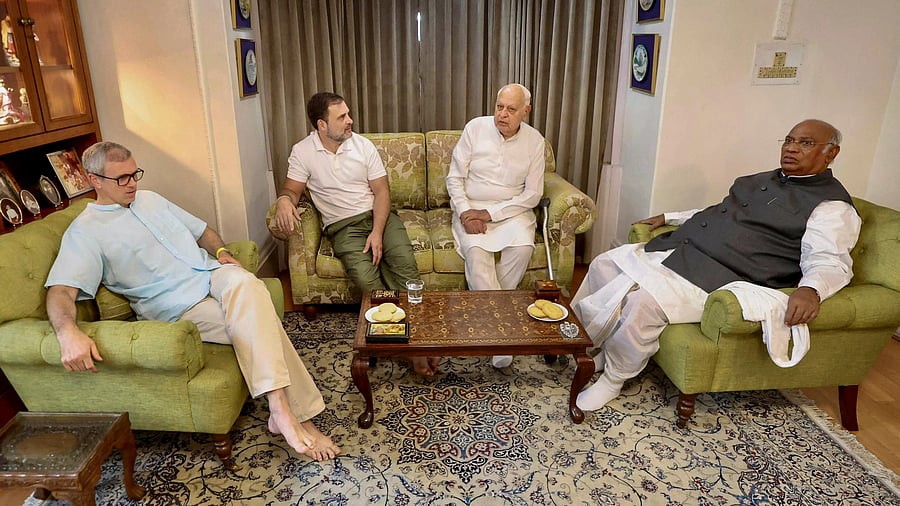
Congress President Mallikarjun Kharge with party leader Rahul Gandhi meets J&K National Conference President Farooq Abdullah and J&K CM Omar Abdullah.
Credit: PTI File Photo
Srinagar: The widening rift between the National Conference (NC) and the Congress in Jammu and Kashmir has pushed the I.N.D.I.A. bloc to the brink of a split, exposing deep cracks within the opposition alliance just a year after the Union Territory’s first Assembly polls since the abrogation of Article 370.
After a marathon meeting on Monday, the Congress announced it would not contest the “risky” Rajya Sabha seat offered by the NC, accusing its senior ally of reneging on an earlier promise to offer a “secure seat.” The fallout has triggered speculation that the alliance—seen as the strongest political counterweight to the BJP in J&K—may be heading for a formal rupture.
J&K Congress president Tariq Hamid Karra said the NC had “caused great damage to the trust between partners,” adding that his party would consult its central leadership before taking a call on future participation. “Our national president Mallikarjun Kharge was assured of a safer seat. Instead, the NC offered us seat number four, which is clearly not winnable,” Karra said.
AICC general secretary G.A. Mir also voiced discontent, saying there had been “no coordination or discussion” on governance or policy issues for over a year.
Despite the public sniping, sources within both camps said there is “no immediate threat” to the Omar Abdullah-led government. The NC, with 41 MLAs in the 88-member House, enjoys outside support from five Independents and one CPM legislator, comfortably crossing the majority mark of 45 even without Congress’s six MLAs.
However, observers say, politically, the implications of a split could be far-reaching. Since the 2019 revocation of Jammu and Kashmir’s special constitutional status, both NC and Congress have demanded the restoration of statehood and constitutional safeguards for land and jobs.
“The I.N.D.I.A. bloc’s unity in the region had symbolized resistance to the BJP’s centralizing push and its narrative. A breakdown in the NC–Congress alliance would fragment that opposition space and also give the BJP the opportunity to make fresh inroads in the Valley,” said political analyst Prof Gul Mohammad Wani.
For Omar Abdullah, whose government is about to complete a year, keeping the I.N.D.I.A. bloc intact is as much about optics as stability. “A Congress exit—even without numerical consequences—would undercut NC’s national positioning as the key secular pillar within the alliance. It could also weaken Omar’s already strained leverage within the INDIA bloc,” Prof Wani added.
The NC leadership insists the differences are “tactical, not ideological,” and that the alliance will survive. But Congress leaders privately argue that NC’s dominance in governance and decision-making has reduced their role to “junior partner status.”
For the BJP, watching from the sidelines, the discord offers a strategic opening. A weakened or divided I.N.D.I.A. bloc in J&K would allow the saffron party to project itself as the only cohesive political force with a national vision for the region.
Even if it cannot return to power in the Valley, it could consolidate its hold in Jammu’s Hindu-majority seats and strengthen its claim that “regional parties are driven by self-interest, not people’s welfare.”
Whether the NC and Congress can mend their ties may depend on the central leaderships in Delhi—particularly on whether Kharge and Omar Abdullah can strike a fresh understanding.
For now, both sides are posturing carefully. The Congress doesn’t want to appear as the one breaking ranks with the I.N.D.I.A. bloc, while the NC doesn’t want to seem arrogant or dismissive toward its partner. But the friction has already signaled what many in Kashmir’s political circles have long feared—that the opposition unity experiment in J&K may be too fragile to survive the weight of ambition and mistrust.